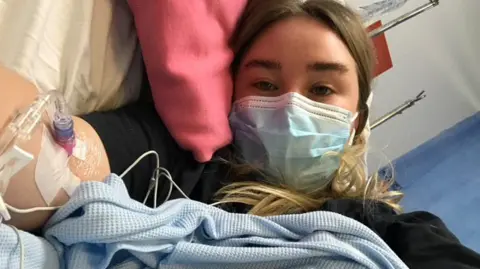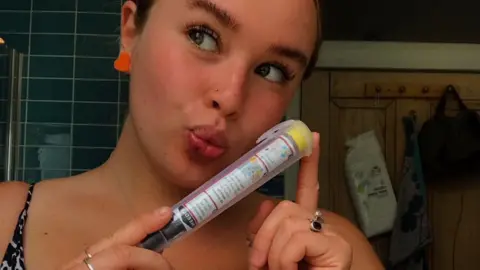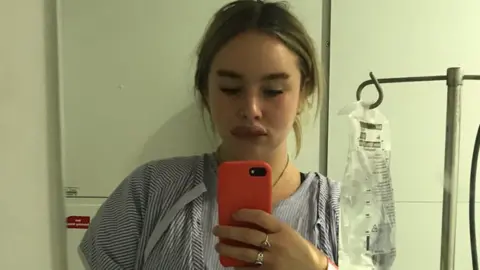'Classmates threw Snickers at me to test my allergy'
 Chloe Dickson
Chloe DicksonA woman is raising awareness on social media of the severe food allergy she lives with, saying she had Snickers bars "snapped in half and thrown" at her when she was at school to test her peanut allergy.
Chloe Dickson, 26, from Brighton, has anaphylaxis - a condition which causes her to go into anaphylactic shock when exposed to peanuts.
Garnering millions of views through her Peanut Free Zone social channels, she says she has received death threats and been called "selfish" due to "misunderstandings" about her allergy.
"In secondary school, kids didn't believe I'd react without eating something," Ms Dickson told BBC South East.
 Chloe Dickson
Chloe DicksonPosting videos to TikTok and Instagram, Ms Dickson showcases her daily life from taking trains and planes, to working at a cafe and documenting allergic episodes.
A life-threatening reaction in a pub, when none of her friends knew how to use her EpiPen, was a "turning point" that compelled her to raise the profile of her condition.
Charity Anaphylaxis UK says that about one in 50 children and one in 200 adults in the UK have a nut allergy, ranging from mild to life-threatening.
Condition 'feels like a secret'
Having worked in the hospitality industry since she was a teenager, Ms Dickson said she had been fired before as an employer wanted to serve dishes with peanuts.
She said being told that she was "too high risk" by potential employers had been a "massive anxiety" and made her condition feel "like a secret".
In response to critical online comments, she said: "I'm just a human and enjoy working in a café.
"I want to be doing fun and exciting things too."
Working at Moksha Caffe in Brighton, which became a peanut-free space five years ago to accommodate her, she said management had been "incredible".
Ms Dickson said her goal was to encourage Brighton hospitals to go peanut-free.
 Chloe Dickson
Chloe DicksonAnalysis of NHS data hospitalisations between 1998 and 2018 reveals that 86 (46%) fatalities out of 152 from food-induced anaphylaxis were triggered by peanut or tree nuts, according to research from the Food Standards Agency and Imperial College London.
Peanut-free spaces
In the UK, restaurants, cafés and takeaways serving "non-prepacked food" must provide accurate information on the major 14 allergens, following the Food Information Regulations 2014.
Paul Carey, a spokesperson from allergy campaign group Owen's Law, told BBC South East that best practice allergen information should "always be provided in writing at the point of ordering without the customer having to ask".
He wants this to become law after his son, Owen, died during his 18th birthday celebrations after unknowingly eating a burger containing buttermilk.
On having dedicated peanut-free spaces for people like Chloe, Mr Carey said: "If people with allergies want to feel safe, then going to a place which is guaranteeing that can only be a good thing."
Follow BBC Sussex on Facebook, on X, and on Instagram. Send your story ideas to [email protected] or WhatsApp us on 08081 002250.
